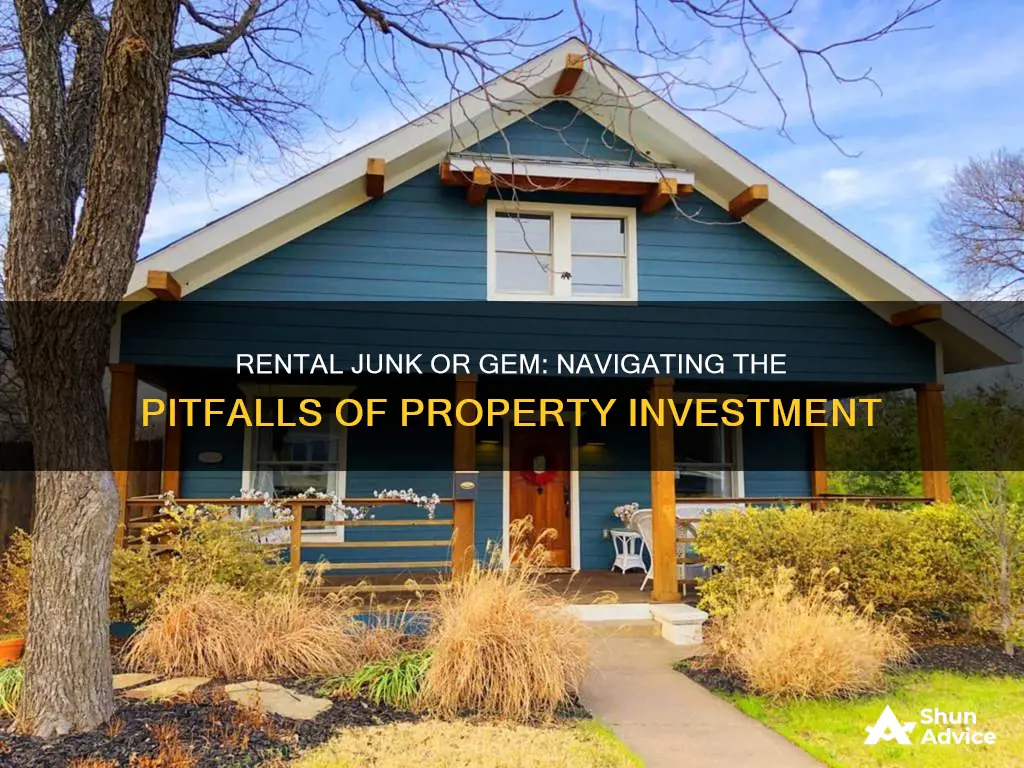
Investing in real estate can be a lucrative but challenging endeavour. While buying junky rental units for investment may seem like a risky move, there are certain instances where it can be a strategic choice. Here are some factors to consider:
- Cash Flow Management: It is crucial to understand the concept of cash flow, which is the income generated from rent and other services minus the operating expenses, such as mortgage payments, utilities, insurance, and maintenance. Most investors prefer properties with positive cash flow, but there are times when investing in a negative cash flow property can be advantageous.
- Future Capital Growth Potential: If the junky rental unit is located in an area with high potential for real estate appreciation, it may be a good investment opportunity. The key is to perform thorough market research and ensure that the capital gains outweigh the maintenance costs during ownership.
- Renovation and Upgrades: Investing in a junky rental unit can be profitable if you plan to renovate and upgrade the property to a higher standard. By adding amenities, replacing old systems, and improving efficiency, you can charge higher rent and turn the negative cash flow property into a positive one.
- Change of Property Use: Sometimes, a negative cash flow rental property can be turned around by changing its use. For example, switching from Airbnb to traditional rentals if the latter is more suitable for the location.
- Flipping the Property: Negative cash flow investing may be feasible if you intend to flip houses rather than hold them long-term. This strategy relies on a solid plan for renovations and a quick marketing and sales process.
- Due Diligence: It is essential to conduct thorough research and due diligence before investing in junky rental units. This includes analysing the neighbourhood, vacancy rates, average rent, future development plans, and natural disaster risks. Additionally, understanding the legal requirements, landlord-tenant laws, and property management responsibilities is crucial.
- Financial Considerations: Investing in rental properties requires a significant financial commitment. Be prepared for higher interest rates, down payments, and closing costs compared to primary residences. Ensure you have sufficient funds to cover maintenance, repairs, and unexpected expenses.
In conclusion, while buying junky rental units for investment may not always be advisable, there are specific scenarios where it can be a strategic choice. It is essential to approach this decision with a comprehensive understanding of the market, the property, and your financial capabilities.
| Characteristics | Values |
|---|---|
| Income | Income comes from rent and other charged services such as laundry, gym membership, and parking. |
| Expenses | Expenses include mortgage payments, utilities, insurance, property taxes, rental property management, repairs and maintenance, and other miscellaneous ongoing costs. |
| Cash flow | When rental income equals rental expenses, the investment property is at a break-even point. Positive cash flow occurs when income is greater than expenses, and negative cash flow occurs when expenses exceed income. |
| Appreciation potential | Look for properties with appreciation potential and good projected cash flow. |
| Location | Choose locations with low property taxes, good school districts, and walkable amenities such as restaurants, coffee shops, and parks. A low crime rate, easy access to public transportation, and a growing job market are also desirable. |
| Vacancy rates | High vacancy rates force landlords to lower rents to attract tenants, while low vacancy rates allow for rent increases. |
| Rental income | Research the average rent in the area and determine if it can cover your mortgage payment, taxes, and other expenses. |
| Property taxes | Property taxes can vary widely across different areas. Consider the potential for tax increases in the future. |
| Crime rates | Choose locations with low crime rates and check if criminal activity is on the rise or declining. |
| Employment opportunities | Locations with growing employment opportunities tend to attract more tenants. |
| Development plans | Be cautious of new developments that could hurt property prices or compete with your rental property. |
| Natural disasters | If the area is prone to natural disasters, insurance coverage costs could impact your rental income. |
| Maintenance | Consider the costs of maintaining the property, which depend on its age and how much upkeep you plan to do yourself. |
| Management | You can manage the property yourself or hire a property manager, who typically charges between 8% and 12% of collected rents. |
What You'll Learn
- Weigh up the costs of maintenance and upkeep against rental income
- Research the local market, including average rent, taxes, and property values
- Understand landlord-tenant laws, including rights and obligations
- Consider the benefits of using a property manager
- Assess the potential for future capital growth

Weigh up the costs of maintenance and upkeep against rental income
When considering purchasing a junky rental unit as an investment, it is crucial to weigh the costs of maintenance and upkeep against the potential rental income. This detailed analysis will help you make an informed decision and ensure a profitable and smooth-running rental operation. Here are some factors to consider:
Custom Maintenance Budget:
Every rental property is unique, and a custom maintenance budget is essential. Factors such as the property's age, location, and amenities will influence maintenance costs. Older properties may require frequent repairs, while the location may impact labour and material costs. Creating a tailored budget ensures accurate financial planning and helps avoid overestimating or underestimating expenses.
Rules of Thumb for Estimating Maintenance Expenses:
Several rules can help you estimate maintenance expenses for junky rental units:
- The 1% Rule: Set aside 1% of the property's value annually for repairs and maintenance. For a $300,000 property, budget $3,000 per year.
- The 50% Rule: Subtract 50% of the monthly rental income for expenses and maintenance. If the rent is $1,500 per month, allocate $750 for expenses.
- The 5X Rule: Estimate annual maintenance costs at 1.5% of the monthly rental income. For $1,000 in monthly rent, budget $1,500 per year for repairs.
- The Square Foot Rule: Calculate anticipated maintenance costs at $1 per square foot per year. For a 1,800 square foot property, budget $1,800 annually.
Operating Expenses:
Operating expenses on rental properties can range from 35% to 80% of gross operating income. These expenses include homeowners insurance, homeowners association fees (HOA), property taxes, and monthly costs such as pest control, landscaping, and routine maintenance. It's essential to consider these expenses when weighing the costs of upkeep against rental income.
Property Management:
You can choose to manage the property yourself or hire a property manager. Property managers typically charge between 8% and 12% of collected rents and handle various tasks such as arranging maintenance, screening tenants, and handling late rent payments. While hiring a property manager incurs additional costs, it can provide valuable expertise and time savings.
Landlord-Tenant Laws:
As a rental property owner, it's crucial to understand landlord-tenant laws in your state and locale. These laws outline the rights and obligations of both tenants and landlords regarding security deposits, lease requirements, eviction rules, and fair housing laws.
Insurance:
In addition to homeowners insurance, consider purchasing landlord insurance, which covers property damage, lost rental income, and liability protection in case of injuries related to property maintenance issues. This type of insurance provides an extra layer of protection for your investment.
By carefully considering these factors and weighing the costs of maintenance and upkeep against the expected rental income, you can make a more informed decision about investing in junky rental units. It is essential to remember that each property is unique, and a thorough analysis will help you maximize your investment potential.
Presidential Election Outcomes: Navigating the Investing Landscape
You may want to see also

Research the local market, including average rent, taxes, and property values
Researching the Local Market
When considering investing in junky rental units, it is crucial to conduct thorough research on the local market, including average rent, taxes, and property values. Here are some detailed instructions to guide you through the process:
Step 1: Define Your Objectives and Gather Information:
Start by clearly defining your investment objectives. Are you primarily focused on maximizing profitability, assessing potential opportunities, or evaluating the performance of your existing rental properties? Once your objectives are set, you can select the appropriate research tools and resources. Utilize reliable real estate websites, local listings, and market reports to gather comprehensive information.
Step 2: Collect Property Information:
Collect detailed information about the property you are considering. This includes data such as size, layout, amenities, condition, and historical rental income. Organize this information in a spreadsheet for easy access and analysis. Additionally, gather information on utilities, parking, appliances, flooring, outdoor space, security features, pet policies, and proximity to public transportation and amenities.
Step 3: Analyze the Neighborhood:
The surrounding neighborhood plays a crucial role in the rental market. Assess factors such as school quality, safety, parks, recreational areas, and the sense of community. Understand the tenant demographics and rental demand in the area. Look for signs of development or revitalization plans, as these can indicate potential investment opportunities.
Step 4: Identify Comparable Properties:
Search for comparable properties, or "comps", in the same neighborhood with similar characteristics to your target property. Consider factors such as proximity, square footage, rent price, number of bedrooms and bathrooms, lot size, condition, and amenities. Analyze recently rented or currently available properties to get a sense of the market rent.
Step 5: Calculate and Analyze Financial Metrics:
Use the data you've gathered to calculate essential financial metrics. Determine the average rental price for comparable properties to set a competitive and attractive rent. Calculate the gross rent multiplier (GRM) by dividing the property's market value by its annual rental income. Assess the property's cash flow by subtracting operating expenses from rental income. Calculate metrics like the cap rate, return on investment (ROI), break-even point, vacancy rate, operating expense ratio, and return on equity (ROE). These metrics will provide insights into the property's financial viability and potential returns.
Step 6: Make Informed Decisions:
Based on your analysis, make informed decisions about purchasing, renting, or renovating the property. Consider the rental potential, purchase price, and how it aligns with your investment goals. Evaluate the balance between attracting tenants and ensuring profitability. By conducting a thorough local market analysis, you can set competitive rental rates, make profitable investments, and optimize the performance of your rental properties.
Russia: Invest or Avoid?
You may want to see also

Understand landlord-tenant laws, including rights and obligations
When investing in rental properties, it is crucial to understand the landlord-tenant laws, encompassing the rights and obligations of both parties. These laws provide a framework to navigate the rental process, from signing a lease agreement to handling security deposits and addressing maintenance issues. Here is a detailed overview of the key aspects:
Lease Agreements:
The lease agreement is a fundamental document that outlines the terms and conditions of the rental arrangement. It should include essential information such as the names of the landlord and tenants, the address and description of the rental unit, the duration of the lease, rent payment terms, security deposit details, and any rules regarding pets. Lease agreements can be oral or written, but written agreements are generally recommended for clarity and legal protection.
Security Deposits:
Security deposits are common in rental arrangements and are intended to cover any potential damages caused by the tenant during their tenancy. The amount of the security deposit varies but is typically limited by state laws. Landlords are responsible for safeguarding these deposits, often in a separate account, and returning them to tenants when they move out, minus any deductions for repairs or cleaning. A walkthrough of the property before move-in, along with photographic or video evidence, can help prevent disputes.
Landlord's Rights and Obligations:
Landlords have the right to collect rent and enforce the terms of the lease agreement. They are also entitled to inspect and access the property for repairs, provided they give reasonable notice to the tenant. Additionally, landlords are responsible for maintaining the property's habitability, including addressing repairs to the structure, exterior, and essential systems like heating, plumbing, and electrical appliances. They must also ensure the property is safe and free from health hazards, such as lead poisoning or mold.
Tenant's Rights and Obligations:
Tenants have the right to live in a safe, habitable, and undisturbed environment. They are entitled to "quiet enjoyment" of the premises, which means landlords must provide notice before entering the property. Tenants are responsible for keeping the property reasonably clean and maintaining respectful behavior toward neighbors. They also have rights under the Fair Housing Act, which protects against discrimination based on race, color, religion, national origin, gender, age, familial status, and disability.
Termination and Eviction:
Both landlords and tenants have the right to terminate the rental agreement, typically with a specified notice period. If a tenant violates the lease terms, such as failing to pay rent or causing damage, landlords may initiate the eviction process, which varies by state. It often involves providing notice, filing an eviction lawsuit, and, if necessary, involving law enforcement to facilitate the eviction.
Understanding landlord-tenant laws is essential for both parties to ensure a smooth and fair rental experience. It is advisable to seek legal guidance when navigating these laws, especially in more complex situations, to protect your rights and fulfill your obligations.
Future Fortunes: Unlocking the Power of Compounding
You may want to see also

Consider the benefits of using a property manager
If you're considering purchasing junky rental units for investment, you may want to think about hiring a property manager. Here are some benefits of using a property manager:
Screening Tenants
Property managers are experienced in reviewing tenant applications and can more easily spot red flags. They know what qualities to look for in a good tenant, such as a history of paying rent on time and taking care of the property. By handling the screening process, property managers can improve your chances of finding reliable renters.
Point of Contact for Tenant Concerns
A property manager can address tenant concerns and maintenance issues at all hours of the day. This is especially convenient if your rental unit is in a different town or state, as you won't have to drive over to inspect the property yourself. They can also handle complaints and be the point of contact for noisy neighbours or other issues, reducing the stress and headaches of being a landlord.
Marketing and Advertising Your Property
Property managers are skilled at marketing rental properties, including writing ads, taking high-quality photos, and hosting open houses. They have local real estate knowledge and can help set a competitive rent price. This can help fill your property faster and reduce the time it sits vacant.
Decreasing Tenant Turnover
Good property management companies know how to keep tenants happy by being responsive and addressing problems promptly. Happy renters are more likely to renew their leases and accept reasonable rent increases. Lower tenant turnover means less time and money spent on finding new tenants and preparing the unit for rent.
Rent Collection and Evictions
Property management companies are motivated to ensure consistent rent collection as they deduct their fees from the monthly rent. They can help enforce lease policies and know how to deal with late or non-payments, including issuing eviction notices if necessary. This can save you from the awkwardness and difficulty of collecting payments yourself.
Legal Compliance
Property managers understand landlord-tenant laws and fair housing laws, helping you avoid potential lawsuits and saving you time and money in the long run. They can also handle lawyer fees associated with evictions or property damage issues, and ensure your property remains compliant with local, state, and federal regulations.
Maintenance and Repair Costs
Property management companies may have relationships with maintenance workers and vendors, allowing them to get the best work at the best price. They can perform regular inspections and address issues before they become bigger problems, reducing emergency repair bills. Additionally, some property managers have in-house maintenance staff, providing further savings.
Time Savings and Stress Reduction
Hiring a property manager can free up your time by handling the day-to-day management of your rental property and tenants. This is especially beneficial if you have multiple properties, live far away, or have a busy schedule. It allows you to focus on other aspects of your career or investment strategy without the constant worry of interruptions.
Life Insurance or Investments: Where Should Your Money Go?
You may want to see also

Assess the potential for future capital growth
When considering the potential for future capital growth, it is important to remember that real estate investing is a complex and nuanced venture with many variables to consider. Here are some key factors to assess when evaluating the potential for future capital growth in "junky rental units":
- Location: The adage "location, location, location" rings true in real estate investing. Look for areas with low property taxes, good school districts, and walkable amenities such as restaurants, cafes, and parks. Additionally, consider the crime rate, access to public transportation, and job market trends. Areas with a growing population, improving infrastructure, economic growth, or revitalisation plans often signal potential for capital growth.
- Market Trends: Keep a close eye on real estate market trends and try to identify locations where the market is about to take a positive turn. Buying during a down market can be a strategic move, but it is important to perform thorough research and due diligence.
- Compounding Returns: Capital growth benefits from compounding returns. Even a small percentage increase in property value each year can lead to significant gains over time, resulting in exponential wealth creation.
- Equity Advantages: As the value of your property increases, so does your equity. This increased equity can be leveraged to secure additional loans or make further property investments, creating a positive cycle of wealth accumulation.
- Long-Term Strategy: Capital growth is typically a long-term game. Consider your investment horizon—are you willing to hold onto the property for several years to allow for potential growth?
- Fundamental Drivers: Understand the underlying factors that could drive price increases in a particular location. For example, advancements in infrastructure, economic growth, or population surges can positively impact property values.
- Risk Tolerance: Investing in "junky rental units" may carry higher risks, including higher maintenance and repair costs, tenant turnover, and potential for vacancies. Ensure you are comfortable with the level of risk and have contingency plans in place.
- Cash Flow: Assess the potential impact of capital growth on your cash flow. While negative cash flow properties can be turned into positive ones, it is crucial to ensure that you can cover any short-term losses with your personal income until the property appreciates in value.
- Comparative Analysis: Compare the prices of similar rental units in the area, both in terms of listing prices and final selling prices. This will help you identify if there is room for future capital growth and ensure you don't overpay.
- Renovation Potential: Consider the potential for renovation or upgrade to increase the value of the rental unit. Sometimes, minor renovations or cosmetic changes can significantly enhance a property's appeal and rental rates, leading to higher capital growth.
Remember, investing in "junky rental units" can be risky, and there are no guarantees of future capital growth. Always perform thorough research, consult professionals, and understand your financial goals and risk tolerance before making any investment decisions.
Purchasing Power: Exploring the Best Assets to Buy for Long-Term Wealth
You may want to see also
Frequently asked questions
It depends. Taking out a loan to buy junky rental units for investment can be risky, but it may be worth it if you have a solid financial plan and can make the numbers work in your favour. Consider seeking professional advice before making a decision.
There are a few things to keep in mind when considering buying junky rental units for investment. Firstly, be aware of the potential for hidden fees and junk fees, which can add up quickly and eat into your profits. Secondly, do thorough research on the location, including vacancy rates, average rent prices, and future development plans. This will help you determine if the investment is financially feasible. Finally, consider the time and money required for maintenance and upkeep, as these costs can also impact your rental income.
Buying junky rental units for investment can be lucrative if you are able to renovate and increase the rental income. It may also be a good opportunity if there is potential for future capital growth or if you plan to change the use of the property.







